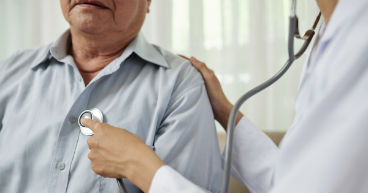
More people are surviving cancer than ever before, thanks mostly to earlier detection and treatment advances. That’s good news, of course. But it also means cancer survivors are living long enough to develop a second, or secondary, cancer.
If you’re living with cancer or are a cancer survivor, preventing another cancer from developing may be low on your priority list. After all, you may think, why should you bother with cancer screenings and healthy lifestyle habits when you’ve already had the diagnosis?
But practicing behaviors like eating well and exercising may not only help reduce your risk of another cancer, it can also help your treatments work better and improve your quality of life.
“It’s very important that we follow patients to help prevent the development of other cancers,” says Pankaj Vashi, MD, Medical Director of Gastroenterology/Nutrition & Metabolic Support and Vice Chief of Staff at City of Hope® Cancer Center Chicago. This is especially true for cancers, such as breast, prostate and colon, that have effective screening tests to find disease early.
In this article, we’ll explore:
- What is a secondary cancer?
- Cancer screening and prevention among survivors
- Reducing future cancer risk
If you’ve been diagnosed with cancer and are interested in a second opinion on your diagnosis and treatment plan, call us or chat online with a member of our team.
What is a secondary cancer?
People with cancer often fear the disease will come back (called a recurrence). Even if your imaging tests show no evidence of cancer, recurrence is always a possibility. When cancer recurs, it comes back in the same part of the body or in a different area where it’s spread.
But people with cancer are also at a slightly higher risk for developing another type of cancer, called a secondary cancer.
Secondary cancers are a completely different type of cancer from your original diagnosis.
How common is secondary cancer?
The risk of developing a secondary cancer is relatively small. According to the American Institute for Cancer Research, it’s between 1 percent and 3 percent. Yet it increases not only if you’ve already had cancer, but also if you have one of the following risk factors:
- A family member with cancer or a condition linked to cancer
- A history of certain types of radiation therapy or chemotherapy, especially as a child, teenager or young adult
- Unhealthy lifestyle habits
Cancer screening and prevention among survivors
In general, if a screening test or cancer prevention strategy was recommended for you before you were diagnosed with cancer, it still applies after, says Stephen Lynch, MD, Primary Care and Intake Physician and Vice Chief of Staff at City of Hope Cancer Center Phoenix. Again, this is especially true for screening tests such as mammograms, PSA or prostate-specific antigen tests and colonoscopies.
For patients who are expected to survive their cancer, it’s important to continue with these screening tests, Dr. Lynch says. But for those whose life expectancy may be limited because of their diagnosis, the recommendations may change.
“If someone has metastatic lung cancer (and may not survive), then doing things like a screening colonoscopy would need to be individualized and may not be recommended,” he says. “It’s really more about prognosis and life expectancy when making decisions about whether or not to continue with routine screening.”
A general rule of thumb is to talk to your doctor about what screenings are appropriate for you. He or she is well positioned to give you advice based on your age, diagnosis and overall health.
The same rule applies for healthy lifestyle habits.
Risk factors for many common cancers include poor eating habits, drinking alcohol, smoking and not getting enough exercise, Dr. Vashi says. “Once a patient is diagnosed with cancer, it’s crucial that they address these risk factors to prevent poor outcomes,” he adds. Plus, it can help prevent other chronic conditions, like diabetes and heart disease.
Your doctor can help you develop a plan for adopting healthier behaviors. These may include:
- Being physically active
- Eating a diet rich in vegetables, fruits and whole grains
- Limiting alcohol use
- Limiting processed foods and red meat
- Maintaining a healthy weight
- Not smoking and avoiding other tobacco exposures
Reducing future cancer risk
If the goal of your cancer treatment is remission or adding years to your life, you’ll want to be as healthy as possible as you enter survivorship.
“There can be a fatalistic approach (to cancer prevention after someone has already had cancer) where a person might say, ‘Well, you know, this is already happening, so I’m just going to put this off,’” Dr. Lynch says. “But I like to say that mom was right. She told you to go to sleep on time because you need your rest. She told you to eat your vegetables, get outside and play and get exercise. And don’t you dare be smoking and drinking. All the advice mom gave you when you were younger really comes to fruition when we look at studies on (cancer) risk factors.”
If you’ve been diagnosed with cancer and are interested in a second opinion on your diagnosis and treatment plan, call us or chat online with a member of our team.


